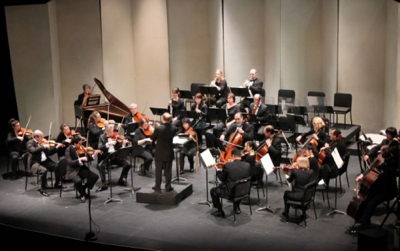KSO Chamber Classics: Orchestra Soloists
Lucas Richman, conductor; Phillip Chase Hawkins, trumpet; Aaron Apaza, bassoon
Sunday, January 11, 2015—2:30 p.m.
Bijou Theatre, Downtown Knoxville
No detective work is required to figure out that 2015 is going to be a year of adventure and excitement for Knoxville’s music and fine arts scene. The 2015 Big Ears Festival in March promises to bring a lot of attention to the city and its music scene—and Maestro Lucas Richman ends his tenure with the Knoxville Symphony Orchestra in May as the search for his replacement goes into high gear. One can also find plenty of excitement in the current music schedule, a schedule that picks up next Sunday with the first KSO Chamber Classics Series concert of the year.
I’ve been on record as saying that some of the most exciting and satisfying performances in Knoxville’s classical music scene come from that KSO series at the Bijou. Excitement this time comes from two concertos that I can’t recall ever hearing in Knoxville: the “Johann Stamitz/Johann Holzbogen” Trumpet Concerto in D Major and Mozart’s Bassoon Concerto. Soloists in both works are principals from the orchestra—principal trumpet Phillip Chase Hawkins and principal bassoon Aaron Apaza.

A word of explanation about the “Stamitz/Holzbogen” concerto—the concerto has traditionally been attributed to Johann Stamitz (1717-1757) although the title page of the work does not name the composer. Modern historians have suggested that the work may be by Johann Holzbogen (1727-1775) for several reasons, among them the fact that Stamitz was not known otherwise for writing specifically for the trumpet. The concerto also bears the stylistic signs of a work with more “classical period” flavor than Stamitz generally revealed during his later years. Nevertheless, the work is a major one for trumpet soloists—and a performance that shouldn’t be missed.
Mozart’s Bassoon Concerto may have been one of four that Mozart wrote in his late teen years, yet this one is the lone survivor of the ages. Although it is not known which bassoonist Mozart was writing for, no doubt a court musician in Salzburg of 1775, the work requires an extremely accomplished player to handle the lively passages and the almost uncommonly eloquent lyricism.
The orchestra and KSO conductor and music director Richman will conclude the Sunday afternoon with Richard Strauss’ Le Bourgeois Gentilhomme. I’ll have more on that work in tomorrow’s article.








